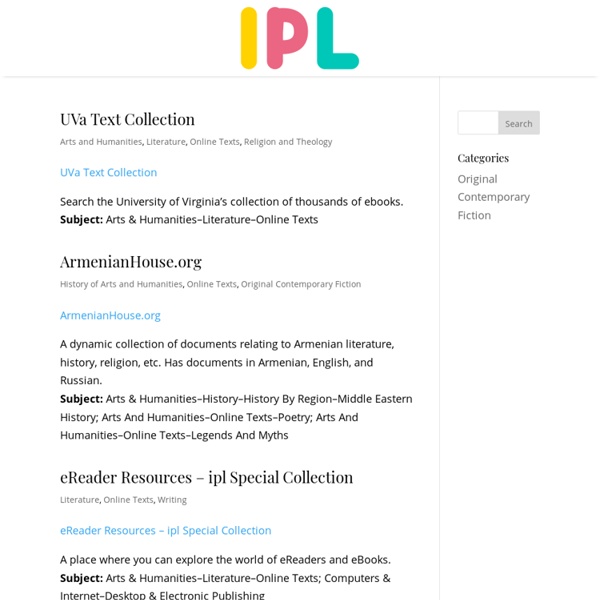Free ebooks - Download 20,000 free ebooks at the eBook Directory.
Read Books Online Free - Romance Novels Online
Best Sites for Free eBooks, Audiobooks, Textbooks, etc
Below is a list of popular websites to get free ebooks. All are reputable and have been around for several years. Major ebook retailers often have free ebooks as well, classics that are in the public domain, and promotional titles that are often only free for a limited time. Make sure to check out The eBook Reader Blog for promotional free ebooks from Amazon, Sony, B&N, and others. Project Gutenberg The first producer of free electronic books, Project Gutenberg has over 30,000 titles to choose from, over 100,000 if you include its affiliate and sister sites for worldly books. Project Gutenberg is more than just ebooks. These are the most common file types for ebooks: EPUB, MOBI, Plucker, HTML, Plain Text, QIOO, MP3, some PDF. The site is broken down into categories and you can search by title or author. Feedbooks Feedbooks is a good choice for ebooks becuase their are nicely formatted. Feedbooks is compatible with a number of mobile and dedicated readers. Manybooks.net Baen Free Library
Authorama - Public Domain Books
300 Free eBooks: Download Great Classics for Free
Download 800 free eBooks to your Kindle, iPad/iPhone, computer, smart phone or ereader. Collection includes great works of fiction, non-fiction and poetry, including works by Asimov, Jane Austen, Philip K. Dick, F. Scott Fitzgerald, Neil Gaiman, Tolstoy, Dostoevsky, Shakespeare, Ernest Hemingway, Virginia Woolf & James Joyce. Also please see our collection 1,000 Free Audio Books: Download Great Books for Free, where you can download more great books to your computer or mp3 player. Learn how to load ebook (.mobi) files to your Kindle with this video Religious Texts Assorted Texts This list of Free eBooks has received mentions in the The Daily Beast, Computer World, Gizmodo and Lifehacker.
The On-Line Books Page
Listing over 3 million free books on the Web - Updated Thursday, May 13, 2021 Search our Listings -- New Listings -- Authors -- Titles -- Subjects -- Serials We reach Public Domain Day, and 3 million titles -- Blog (Everybody's Libraries) -- Latest Book Listings A Celebration of Women Writers -- Banned Books Online -- Prize Winners Online General -- Non-English Language -- Specialty About Us -- FAQ -- Get Involved! Edited by John Mark Ockerbloom (onlinebooks@pobox.upenn.edu) OBP copyrights and licenses
Free eBooks at Planet eBook - Classic Novels and Literature You're Free to Share



